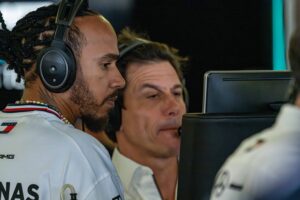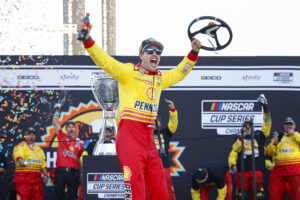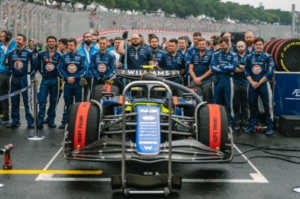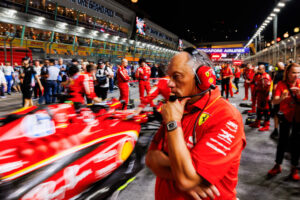The absence of Motorsport at the Summer Olympic Games in Paris, which opens later today, stands out as F1 heads to Belgium.
Motorsport remains noticeably absent from the Olympic Games as Paris prepares to host the much anticipated 2024 edition from July 26 to August 11. With IndyCar, F1 Academy, and FE on a break, and series such as F1, F2, and F3, having one race to go before the Summer shutdown, the lack of motorsport will be felt worldwide.
IT’S HERE! 🥹
The #Paris2024 Opening Ceremony is TODAY! 🙌— The Olympic Games (@Olympics) July 26, 2024
Olympic Past
1900
Motorsport has featured twice at the Summer Olympics even though it was not officially recognised as part of the tournament. When it first appeared in 1900, the games were run alongside the World’s Fair. Lasting seven months, its aim was to celebrate the sports achievements of the previous century.
Here, motorsport was divided into 14 categories, which included two, four, six, and seven-seater cars. Electric taxis, delivery vans, trucks, and others were also included. However, this was less about participants and more about manufacturers.
Many companies joined, such as Renault and Panhard, who raced in the Paris-Toulouse-Paris race. This was considered to be the main event, spanning 837 miles in a city-to-city endurance race. It was split into two categories, small car and large car, and was held on open roads set to a time trial. Louis Renault won the small car race in a Renault 1-2-3. They were the only starters, out of eight in total, to finish.
Alfred Velghe won the large car race for Mors with Panhard finishing second and third. Medals were naturally given to the top three of each event. Renault also won gold in the two-seater race for cars under 400kg.
Peugeot claimed first in the two-seater race for cars over 400kg. They also experienced success in various truck sessions. As did the entirety of France as all but one event was won by a French driver. The anomaly was USA’s Gilbert Brown who took gold in the fire truck category. This was the first and final motorsport appearance at the Olympics for 36 years.
1936
Motorsport was included at the 1936 Summer Olympics, hosted in Berlin. A rally took place at the time of the Nazi regime and was used to further propaganda. A notable winner was Briton Elizabeth Haig who claimed gold in her six-cylinder Singer Nine Le Mans. She achieved this with Joyce Lambert as co-driver.
1972
Motorsport would not feature at the Olympics again until the 1972 Munich Games. This Olympic Rally was run before the event started and historically has not been considered part of the Olympics. With this, medals were not given but Jean Todt did win in an Alpine A100. This would be the final appearance despite the fact that the Circuit de Barcelona-Catalunya was built for the 1992 games to host cycling.
2018 Youth Olympic Games
Motorsport did feature in the 2018 Youth Olympic Games in Buenos Aires, Argentina. A karting race was added but only as a demonstration, therefore medals were not awarded. 300 students from local Argentinian schools took part in an initiative by the then-president of FIA Karting, Felipe Massa. This was held at the Kartodromo in the Autodromo Juan y Oscar Galvez. It featured 12 drivers who completed six teams consisting of one boy and one girl. One of the Argentine competitors was Franco Colapinto, an F2 competitor, who won the race from pole position alongside Maria Garcia Puig.
The aim was to have this event occur in Paris in 2024, however this was not chosen.
2021 Virtual Series
In 2021, the Olympic Virtual Series was launched to boost the popularity of esports. The motor racing event was run on Gran Turismo and included a 10-day time trial challenge to qualify. The top 16 then competed in three races that Italy’s Valerio Gallo won. Motorsport is still present in this series and France’s Kylian Drumont is the defending champion. Britain’s William Murdoch and Chile’s Angel Inostroza finished second and third at the 2023 edition.
Future
The question many have is whether motorsport will ever return to the Summer Olympics. As the games begin the same weekend as the Belgium Grand Prix, motor racing feels noticeably absent.
With Squash and flag football making their debut at the Los Angeles games in 2028 alongside cricket and lacrosse set to return, motorsport was overlooked. Many considered this to be a shocking decision considering Liberty Media‘s wish for F1 in particular to gain a wider audience state-wide. There seemed no better way to introduce motorsport to American audiences, and those worldwide, than through the Olympics.
However, its potential format is not straightforward. If F1 was taken to the Olympics, most drivers would not be able to represent the teams they drive for in the championship. While Lando Norris could drive a McLaren and Pierre Gasly could drive an Alpine, George Russell would not be able to drive a Mercedes. Charles Leclerc would not be able to drive a Ferrari, Logan Sargeant would not be able to drive a Williams, and so on.
This would prove complicated, particularly for those drivers who would not be able to represent their country with a suitable car. It would also not help matters if the rules allowed for drivers to race in a car that would not originate from their country, as the Olympic Games are a sign of patriotism.
Drivers’ Thoughts
Lewis Hamilton, who carried the torch for the London 2012 games, believes:
“I just don’t think it’s an Olympic game”.
Max Verstappen reiterates these thoughts:
“No, it’s not for me. It’s too car related. You [drivers] didn’t grow up in that Olympic environment; I don’t think we belong at the Olympic stage. And that’s fine because we have our own championship, which I think is really well received.”
Fernando Alonso has delved further:
“I think it’s [racing as an event in the Olympic Games] quite unlikely because we have the machine with us. Even if you try to organize a go-kart race with exactly the same go-karts, it will never be exactly the same, probably. So, yeah, it is a very unique sport.”
While he understands the difficulties surrounding its inclusion, Charles Leclerc does not share the same sentiment. For the Paris Games, he was an Olympic torchbearer through Monaco as it travelled through France. This came after his service to his country as an athlete.
Charles Leclerc was an Olympic torchbearer through Monaco as the torch relay makes its way through France ahead of the @Paris2024 @Olympics 🔥#F1 pic.twitter.com/alQEnDo66j
— Formula 1 (@F1) June 18, 2024
The Monegasque shared what an honour it was to be asked and his thoughts on going for gold:
“It would be great to have motorsport at the Olympics. However, I think it’s a bit more difficult to organise than other sports because we are all driving for different constructors with different cars in Formula 1. But it’s definitely possible and I would love to represent Monaco.”
Could it Work?
There is still a way to incorporate motorsport into the Olympics despite the difficulties evident.
Drivers could all be given the same car so that there is no team advantage, unlike F1. This time around, it should also focus on the drivers themselves rather than the manufacturers. With this, drivers of various nationalities across F1, F2, F3, FE, F1 Academy, IndyCar, and the World Endurance Championship (WEC) could participate after a qualifying event or a review of their racing record.
It would feel wrong to limit the space to the 20 drivers on the F1 grid. However, the Olympic committee would have to consider the advantage that teams such as Great Britain would experience with Hamilton, Russell, and Norris available on the F1 grid alone. Then consider the likes of Ollie Bearman and Isack Hadjar in F2 and Abbi Pulling in F1 Academy who could compete.
Motorsport does not have to mean cars. Motor racing is also seen through MotoGP, the Motocross World Championship, and the Dakar Rally, among others. This would still see teams send racers to compete for medals and would perhaps fare better with those F1 drivers who do not seem keen.
There is also the option of returning to the Rally format of the 20th century.
Would it be Worth it?
For the Olympic committee, this may seem too difficult a task to execute. For motorsport fans across the world, and a newer audience that is waiting to be introduced to the sport, a reintroduction at the Olympics is more necessary than ever.






